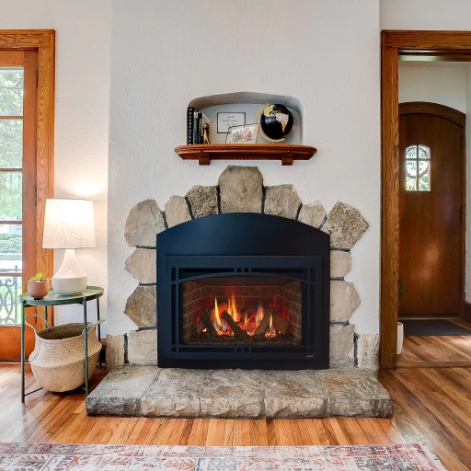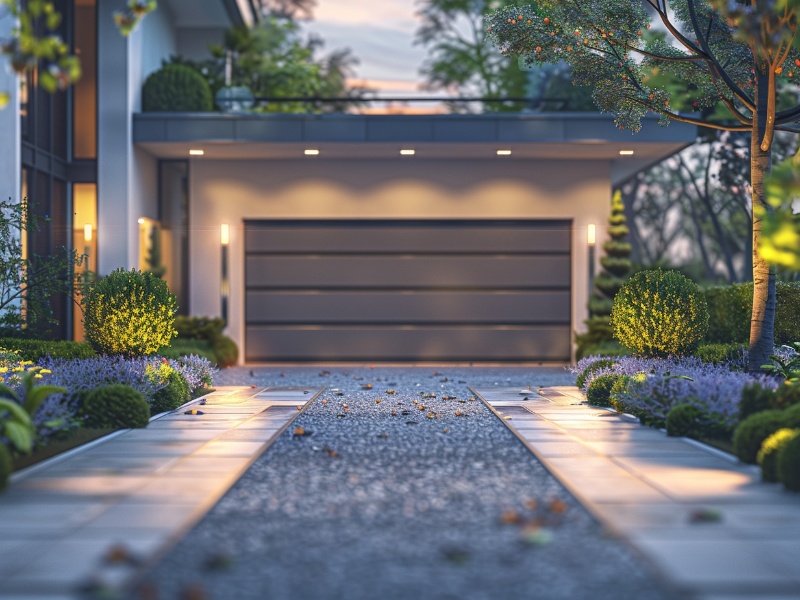Table of Contents
Garage doors are an essential part of any home, providing security and convenience for homeowners.
We explore the different types of garage doors, their standard sizes, and the benefits of thicker doors.
Whether you’re considering a single-layer, double-layer, or triple-layer garage door, understanding their thickness and the factors that influence it can help you make an informed decision for your home.
What Are Garage Doors?
Garage doors are essential components of residential and commercial buildings, serving as entry points for vehicles and providing security and protection for the space.
These doors play a crucial role in enhancing the overall aesthetics of a property, as they are often one of the most noticeable exterior features. Whether elegant carriage-style doors or modern aluminum designs, garage doors contribute significantly to the architectural appeal of a home or business.
In addition to the visual aspect, garage doors are also designed with various materials such as steel, wood, or fiberglass, each offering unique benefits in terms of durability and maintenance. Advanced features like insulation, smart technology, and secure locking systems ensure both safety and convenience for users.
What Are the Different Types of Garage Doors?
There are various types of garage doors available, including steel, aluminum, and wood options, each offering unique aesthetic and functional features for different preferences and needs.
Single-Layer Garage Doors
Single-layer garage doors consist of a single sheet of material, typically steel or aluminum, providing basic insulation and structural support for the door.
These doors are commonly around 1 ⅜ inches thick, with standard dimensions ranging from 8×7 feet to 18×8 feet to accommodate different garage sizes. The single-layer construction means they are more affordable compared to double-layer or triple-layer doors, as they lack the additional insulation and protection layers.
While they offer minimal insulation, they are still effective in providing some level of thermal efficiency. It’s important to consider the climate and usage of the garage when choosing between single, double, or triple-layer garage doors.
Double-Layer Garage Doors
Double-layer garage doors feature added insulation between two layers of material, enhancing energy efficiency and durability while requiring professional installation for optimal performance.
This additional insulation acts as a barrier, reducing heat loss in the winter and heat gain in the summer, making your garage more comfortable throughout the year. The double-layer construction also adds to the structural integrity of the door, increasing its resistance to dents and damage from daily use. Installing these doors typically involves precise measurements and alignment to ensure a proper fit, and professional installation helps to guarantee that the door functions smoothly for years to come. Regular maintenance, such as lubricating hinges and checking seals, can help prolong the lifespan of these doors and ensure their continued efficiency.
Triple-Layer Garage Doors
Triple-layer garage doors offer the highest level of security and weatherproofing, combining insulation layers with durable materials to enhance home aesthetics and curb appeal.
These innovative garage doors not only provide an added layer of protection against harsh weather conditions but also contribute to energy efficiency by regulating interior temperatures. The multi-layer construction acts as a barrier, preventing heat loss during winter and heat gain in summer, reducing energy costs and enhancing overall comfort. The variety of design options available ensures that homeowners can choose a style that complements their property’s architectural features, adding a touch of sophistication and charm to their exteriors.
What Are the Standard Sizes for Garage Doors?
Garage doors come in standard sizes suitable for residential properties, but custom options are available for unique dimensions or commercial applications, ensuring a perfect fit for diverse building requirements.
Single Garage Door Sizes
Single garage doors typically come in standard sizes suitable for most residential garages, with options for automatic, manual, or remote-controlled operation based on user preferences.
These doors are often available in widths ranging from 8 to 10 feet, providing enough space for vehicles to enter and exit easily. The convenience of automatic garage doors allows users to open and close them with a simple click of a button or using smartphone apps. In addition to traditional remote controls, some advanced models can be integrated with smart home systems for seamless automation. The user-friendly control mechanisms make operating the garage door a hassle-free experience, whether you choose to operate it manually or opt for the convenience of automation.
Double Garage Door Sizes
Double garage doors are designed to accommodate larger vehicle entries and are available in standard sizes, with repair and replacement services offered at cost-effective rates for maintenance and upgrades.
The dimensions of double garage doors typically range from 16 to 18 feet wide and 7 to 8 feet high, providing ample space for two vehicles.
When considering the cost of repair or replacement, factors such as material quality, insulation, and design complexity play a significant role in pricing.
Regular maintenance can help prolong the lifespan of garage doors and prevent costly repairs.
Upgrading to newer models with advanced features like smart technology and enhanced security can add value to your property while improving functionality.
Custom Garage Door Sizes
Custom garage door sizes cater to specific spatial requirements and design preferences, offering budget-friendly and energy-efficient solutions that enhance the curb appeal and overall aesthetics of a property.
These tailor-made garage doors are not only designed to suit the individual needs of homeowners but also provide significant energy savings through improved insulation. By eliminating drafts and maintaining consistent indoor temperatures, custom-sized garage doors help reduce heating and cooling costs, making them a cost-effective choice in the long run. The variety of styles, colors, and materials available allows for seamless integration with the existing architecture, ultimately elevating the visual impact of the property and increasing its overall value.
How Thick Are Garage Doors?
Garage doors vary in thickness based on their construction layers, with thicker doors offering increased insulating value and superior weather seal protection against external elements.
Single-Layer Garage Doors
Single-layer garage doors are thinner in construction, typically made of steel or aluminum, requiring minimal maintenance and offering standard security levels for residential properties.
These doors are constructed using a single layer of steel or aluminum sheets, making them lightweight yet durable. It’s important to inspect and lubricate the hinges, rollers, and tracks regularly to ensure smooth operation and prevent premature wear. Adding weather stripping to the bottom edge can help with insulation and keep out dust and debris.
When it comes to security, these doors often feature sturdy locks or bolt systems, adding an extra layer of protection to your garage and home.
Double-Layer Garage Doors
Double-layer garage doors provide enhanced noise reduction capabilities, increased compatibility with various garage door openers, and often come with extended warranties for added assurance.
This noise reduction feature is particularly beneficial for homeowners looking to minimize the disruptions caused by the operation of their garage doors. The increased compatibility with different openers ensures a seamless integration into existing garage setups. The inclusion of extended warranties offers peace of mind to consumers, as it guarantees protection against manufacturing defects and potential repair costs in the long run. These operational advantages, combined with the long-term reliability of double-layer garage doors, make them a practical and durable choice for residential properties.
Triple-Layer Garage Doors
Triple-layer garage doors have an extended lifespan due to their robust construction, are often manufactured by top industry brands, and offer customizable panel designs for a modern or traditional aesthetic.
These high-quality doors are engineered to withstand the test of time, providing homeowners with a reliable and long-lasting solution for their garage needs. Leading manufacturers such as Raynor are known for producing triple-layer garage doors that combine durability with style.
With a wide range of panel design choices available, homeowners can personalize their garage door to complement the overall look of their home, from classic raised panels to modern flush designs.
What Factors Affect the Thickness of Garage Doors?
The thickness of garage doors is influenced by factors such as the material used in construction, the type of insulation incorporated, and the design options chosen for the door panels, all contributing to its overall durability and performance.
Material Used
The material utilized in garage door construction affects its weather resistance capabilities, maintenance requirements, and compliance with local building regulations for safety and structural integrity.
Certain materials like steel and aluminum are known for their excellent weatherproofing qualities, making them ideal choices for areas prone to extreme weather conditions. These materials require minimal maintenance compared to wood, which may need regular painting or staining to preserve its condition.
When selecting a garage door material, it is essential to consider your climate to ensure longevity and durability. Adhering to local regulations concerning material usage is crucial to avoid potential fines or safety hazards.
Insulation Type
The insulation type chosen for a garage door can significantly impact its energy efficiency, the potential for upgrading insulation levels, and the enhancement of overall property value by increasing thermal performance.
Different insulation types, such as polyurethane or polystyrene, provide varying levels of thermal resistance, which directly influence energy savings and home comfort. Opting for high-quality insulation not only keeps the garage space more temperate throughout the year but also adds value to the property. This investment in insulation upgrades can result in long-term cost savings due to reduced energy consumption and contribute to the appreciation of the home’s overall market worth.
Style and Design
The style and design choices for garage doors encompass a variety of options, including color selections, hardware configurations, and modern, traditional, or contemporary aesthetic themes to complement the property’s architectural style.
These design aspects play a crucial role in enhancing the overall look and feel of a property. Color options range from classic neutrals like white and beige to bold hues such as red or blue, allowing homeowners to express their style.
Hardware styles, such as handles, hinges, and decorative accents, can add a touch of elegance or rustic charm. In the modern category, sleek lines and minimalist designs are favored, while traditional garage doors often feature raised panels and ornate hardware for a timeless appeal.
For those with a contemporary taste, clean, simple designs with industrial elements are on-trend, creating a striking contrast against modern architectural themes.
What Are the Benefits of Thicker Garage Doors?
Thicker garage doors offer improved insulation properties, enhanced durability against external elements, and heightened security features, providing comprehensive benefits for residential and commercial properties seeking optimal door performance.
Better Insulation
Thicker garage doors offer superior insulation, reducing energy costs and improving interior comfort levels, with options for DIY installation or professional setup services for optimal energy efficiency.
For homeowners looking to enhance their property’s energy-saving capabilities, investing in thicker garage doors can be a smart choice. The increased insulation provided by these doors helps in maintaining stable indoor temperatures, reducing the reliance on heating and cooling systems. This not only results in lower utility bills but also contributes to a more sustainable living environment.
When considering installation methods, while a DIY approach can be cost-effective for those with the necessary skills, opting for professional setup services ensures correct fitting and maximum energy efficiency benefits. In today’s focus on energy-efficient solutions for sustainable property management, thicker garage doors play a significant role in achieving a greener and more eco-friendly home.
Increased Durability
Thicker garage doors exhibit enhanced durability, with weatherproof construction materials, maintenance tips for long-term performance, and customizable design options to suit varying property styles and preferences.
These robust garage doors are designed to withstand the harshest weather conditions, providing a reliable barrier against rain, wind, and extreme temperatures. By using high-quality weather-resistant materials, such as steel or composite wood, these doors offer superior protection and longevity.
Regular maintenance, such as lubricating hinges and cleaning surfaces, is essential to ensure smooth operation and prevent premature wear. The flexibility in design options allows homeowners to seamlessly integrate their garage door with the overall aesthetic of their property, enhancing curb appeal and overall value.
Enhanced Security
Thicker garage doors provide enhanced security through the incorporation of safety features, advanced security levels, and reliable warranties to ensure peace of mind and protection for property owners.
They are designed to withstand various external challenges, such as forced entry attempts and extreme weather conditions, making them a robust barrier against potential threats. These garage doors often come with security certifications from reputable organizations, assuring homeowners of meeting stringent security standards.
The warranty coverage offered further adds a layer of assurance, guaranteeing repair or replacement in case of any defects or issues that may arise. Investing in thicker garage doors not only enhances the security of your property but also provides long-term peace of mind.
Contact Dreifuss
Dreifuss offers expert solutions tailored to your specific requirements. Their team delivers top-notch service, ensuring your garage door operates smoothly and efficiently.
Dreifuss uses high-quality materials and the latest technology for lasting durability and performance. Trusting Dreifuss means you’ll receive reliable support and maintenance, keeping your garage door in peak condition year-round. Choose Dreifuss for a seamless and worry-free experience with your garage door.
Contact Dreifuss for all your garage door installation, service, and maintenance needs.
Frequently Asked Questions
1. How thick are garage doors?
Garage doors vary in thickness based on their construction. Single-layer doors are the thinnest at around 1 ⅜ inches thick. Double-layer doors offering added insulation, and triple-layer doors provide the highest level of insulation and durability. Both double and triple-layer doors are thicker due to additional layers of insulation and material.
2. What factors affect the thickness of garage doors?
The materials used, the type of insulation incorporated, and the chosen design options influence the thickness. Materials include steel or aluminum, and insulation types include polyurethane or polystyrene. In addition, specific design choices can all contribute to the overall thickness and performance of the door.
3. What are the benefits of thicker garage doors?
Thicker doors provide better insulation, which can lead to reduced energy costs and improved comfort inside the garage. They also offer increased durability against external elements and enhanced security features. This makes them a beneficial investment for homeowners looking for optimal performance.
4. What are the different types of garage doors?
Garage doors come in single-layer, double-layer, and triple-layer types. Single-layer doors consist of a single sheet of material. Double-layer doors add insulation between two layers. Triple-layer doors combine durable materials with multiple insulation layers for maximum security and weatherproofing.
5. What are the standard sizes for garage doors?
Standard sizes vary for single and double garage doors. Single garage doors typically range from 8 to 10 feet wide. Double garage doors are usually 16 to 18 feet wide. Both types standardly have a height of 7 to 8 feet. Custom sizes are also available for unique garage dimensions or commercial applications.
6. How do you maintain a thicker garage door?
Maintaining a thicker garage door involves regular inspections, lubricating moving parts, and addressing any security or durability concerns. Regular checks can help identify potential issues, while lubrication ensures smooth operation. Additionally, keeping up with maintenance can prolong the lifespan and performance of the door.
Latest Articles

What Is An NG (Natural Gas) Indicator And Why You Need It For Your Fireplace
Table of Contents1 Understanding Natural Gas Fireplaces2 What is an NG Indicator?3 Importance of NG Indicators for Safety4 Types of NG Indicators5 Installation and Maintenance of NG Indicators6 Signs of a Faulty NG Indicator7 Frequently Asked Questions Natural gas fireplaces are a favored option among numerous homeowners due to their convenience and effectiveness. But, what is an NG (Natural Gas) indicator and why you need it for your fireplace? It is imperative to comprehend how they function and the significance of having an NG (Natural Gas) indicator for safety purposes. This article delves into the definition and significance of NG indicators. We will discuss the potential hazards associated with the absence of one and the various types of indicators accessible. Also, we will discuss installation and maintenance recommendations, and methods to recognize and rectify issues with malfunctioning indicators. Stay well-informed and ensure the safety of your home by referring to this exhaustive guide. Understanding Natural Gas Fireplaces Natural gas fireplaces serve as an efficient and convenient heating option for numerous households. They utilize natural gas as a fuel source to deliver consistent warmth and ambiance. How They Work and Why They Need NG Indicators The operation of natural gas fireplaces involves igniting natural gas to generate heat. This process requires diligent monitoring to ensure both safety and efficiency, a task facilitated by the use of NG indicators. NG indicators play a critical role in detecting potential gas leaks. They enable residents to promptly address and mitigate any associated hazards. Through continuous monitoring of gas levels and providing timely warnings and alerts, NG indicators uphold a secure indoor environment. It is imperative to ensure that these indicators function properly to facilitate the effective operation of natural gas fireplaces. This helps mitigate the inherent risks linked to gas leaks. What is an NG Indicator? An NG indicator is a specialized device equipped with advanced sensors and technology. It is specifically designed to detect natural gas leaks and monitor gas pressure in appliances, such as fireplaces. Definition and Purpose The NG indicator functions as a detector that monitors gas appliances for potential leaks. It provides essential functionality to ensure safety in households utilizing natural gas. These detectors play a crucial role in protecting residences by notifying occupants of dangerous gas leaks long before they escalate into perilous situations. Through continuous monitoring of gas levels in the vicinity, NG indicators offer an additional layer of protection. This is particularly important in properties that rely on gas-operated fireplaces or stoves. These devices not only help avert potential disasters but also enhance the overall peace of mind of homeowners. They assure them that their living spaces are equipped with reliable safety features. Importance of NG Indicators for Safety Natural gas indicators are essential for maintaining safety in households equipped with natural gas appliances. These devices serve as a proactive measure to promptly detect gas leaks. This offers homeowners a sense of security and assurance. Potential Dangers of Not Having an NG Indicator The absence of an NG indicator in residences equipped with natural gas appliances can pose significant hazards. This includes the risk of undetected gas leaks , carbon monoxide poisoning , and pilot outages that may lead to dangerous situations. These potential risks can profoundly impact indoor air quality. They directly influence the health and safety of individuals residing in the household. Undetected gas leaks can go unnoticed, gradually permeating the air and creating a potentially explosive environment. Insufficient ventilation from undetected exposure to carbon monoxide can lead to serious health complications. These range from mild symptoms such as dizziness to fatal poisoning. Without proper monitoring from an NG indicator, families are left susceptible to these concealed threats. This underscores the critical importance of implementing proactive measures to mitigate such risks. Types of NG Indicators Indicators for Natural Gas (NG) are available in diverse types. Each presents distinct detection capabilities tailored to specific requirements, encompassing both manual and automated alternatives. Manual vs. Automatic Indicators Manual NG indicators require user intervention for monitoring gas levels and identifying leaks. On the other hand, automatic indicators employ sophisticated technology to deliver continuous, real-time monitoring. This heightened efficiency and oversight enhance safety protocols. Conventional manual indicators rely on individuals to physically inspect and evaluate gas levels periodically. This renders them more susceptible to human errors. Conversely, automatic indicators feature sensors capable of promptly detecting even the most minute fluctuations in gas levels. This establishes a more dependable and precise monitoring mechanism. Automatic indicators can activate alerts and shut-off systems upon detecting a leak. This ensures immediate action to avert potential hazards. This advanced technology enhances safety protocols and instills a sense of command and assurance among users. Installation and Maintenance of NG Indicators The reliable and accurate performance of NG indicators necessitates proper installation and consistent maintenance. This often entails professional installation and adherence to recommended service guidelines. Proper Installation and Regular Maintenance Tips The proper installation of NG indicators involves adhering to the specifications in the user manual. Maintenance protocols entail strict adherence to a predetermined maintenance schedule to ensure sustained operational efficiency. During the installation phase, it is imperative to verify that the NG indicators are securely affixed in the designated location as stipulated by the manufacturer. Crucial steps include confirming power source compatibility and ensuring proper grounding of the device to optimize performance. Calibration of the indicator must be executed meticulously to ensure precise readings. Regarding maintenance, essential practices include regular inspection for signs of wear, thorough cleaning of the indicator components, and routine functionality tests. By allocating time to a consistent maintenance regimen, the NG indicator can operate with optimal efficiency over an extended duration. Signs of a Faulty NG Indicator Recognizing indicators of a malfunctioning NG indicator is essential for upholding safety and performance standards. Inaccuracies and detection issues can undermine the efficacy of these devices. Identifying and Addressing Issues The process of identifying and addressing issues related to NG (natural gas) indicators requires a systematic troubleshooting approach. This ensures their optimal performance

What You Need To Know About Gas Log Set Safety And Installation Considerations
Table of Contents1 Understanding Gas Log Sets2 Safety Considerations for Gas Log Sets3 Installation Guidelines for Gas Log Sets4 Maintaining and Troubleshooting Gas Log Sets5 Frequently Asked Questions Gas log sets are a favored option among homeowners seeking to enjoy the comfort and atmosphere of a conventional fireplace without the inconvenience of wood. This article tells you what you need to know about gas log set safety and installation considerations. Before incorporating one into your residence, it is imperative to understand the safety considerations associated with their use. This discussion delves into the potential hazards linked with gas log sets. It presents crucial precautions to uphold the safety of your home. Also, it outlines proper installation procedures and offers insight into common errors to avoid. Finally, it provides advice on maintenance and troubleshooting. Gain comprehensive knowledge on gas log set safety and installation considerations. Understanding Gas Log Sets Comprehending gas log sets is essential for individuals seeking to elevate their fireplace experience, and for gas lag set safety and installation. These heating appliances can operate on either natural gas or propane. In addition, they are available in a range of styles, including vented, ventless, and vent-free options. They provide an array of benefits and customization opportunities through various fireplace accessories. What are Gas Log Sets? Gas log sets are meticulously crafted artificial logs. They are designed to imitate the appearance and functionality of authentic wood logs within fireplaces. These gas log sets typically consist of ceramic or refractory concrete logs that have been skillfully molded and painted. This allows them to replicate the natural grain and texture of real wood. The logs are arranged in various configurations within the fireplace. They establish a realistic and welcoming ambiance. In addition to the logs, gas log sets often include fireplace accessories such as glowing embers. Accessories also include decorative stones, and even pine cones to enhance the overall aesthetic appeal. Homeowners can select from an array of placement options. These include traditional wood stack, cascading driftwood, or a contemporary geometric arrangement. Homeowners can align their preferred style and design preferences. Safety Considerations for Gas Log Sets Safety considerations for gas log sets are of utmost importance to guarantee a secure and pleasant fireplace experience. It is essential to address potential hazards such as carbon monoxide exposure, gas leaks, and fire safety to maintain a safe environment for homeowners. Potential Hazards and Precautions Gas log sets come with potential hazards that must be taken seriously, including the risks of gas leaks, carbon monoxide poisoning, and fire incidents. It is imperative to establish and adhere to rigorous safety measures to ensure the well-being of individuals and properties involved in the use of gas log sets. Gas leaks represent a significant hazard when utilizing gas log sets. They can result in the accumulation of combustible gas within the premises, heightening the possibility of explosions or fires. Carbon monoxide, an insidious gas generated during incomplete combustion, poses a grave threat due to its colorless and odorless nature, making it undetectable without proper monitoring. To address these risks effectively, it is vital to install carbon monoxide detectors and gas leak sensors in the vicinity of the gas logs. Routine maintenance checks on the gas log system, including cleaning and inspection procedures, are critical to ensure safe operations and the prompt identification of potential issues. In case of a gas leak or suspected presence of carbon monoxide, immediate evacuation of the affected area is paramount, followed by prompt contact with emergency services. Recognizing the distinct odor of rotten eggs associated with natural gas can serve as an early warning sign, prompting swift actions to avert any potential accidents. Installation Guidelines for Gas Log Sets The installation of a gas log set necessitates meticulous planning and strict adherence to specific guidelines. This includes verifying a secure gas connection, ensuring proper gas lines are in place, and complying with local building codes. Often, the complexity of these requirements may require the expertise of a certified technician. Proper Installation Techniques The appropriate installation procedures for gas log sets involve the secure connection of gas lines, meticulous adherence to installation manuals, and strict compliance with local building codes. It is imperative to prioritize the guarantee of secure gas connections to avert leaks and potential safety hazards. During the installation of gas log sets, utilizing suitable sealants and fittings is essential to establish a tightly sealed connection. The correct installation of gas lines is critical for both the safety and operational efficacy of the gas log set. Reference to the installation manual is highly advisable for detailed, step-by-step guidance to prevent inaccuracies and ensure the successful establishment of the gas log set. Consistently adhering to building codes and regulations upholds safety standards. Seeking guidance and confirmation from a certified technician before and after installation can offer invaluable support and assurance throughout the process. Common Installation Mistakes to Avoid It is imperative to avoid common installation errors to ensure the secure and effective operation of gas log sets. This includes verifying proper gas connections and compliance with building codes. Improper gas connections can result in leaks and potential hazards, underscoring the importance of verifying the tightness and correct alignment of all fittings. Failure to adhere to building codes can lead to structural complications, penalties for non-compliance, or even safety concerns. To prevent these oversights, it is advised to consult the manufacturer’s installation guidelines and strictly adhere to local regulations. Engaging a certified technician for the installation of gas log sets guarantees that the procedure is carried out accurately and securely. This provides assurance that the system is functioning as intended. Maintaining and Troubleshooting Gas Log Sets Regular maintenance and troubleshooting of gas log sets are imperative to uphold their optimal performance and safety. This includes thorough examination of the pilot light, pilot assembly, and other gas appliances to preserve heating efficiency and promptly resolve any arising issues. Tips for Maintenance and Repair Ensuring the proper maintenance of your gas log set necessitates conducting

Key Considerations For Using Compressed Liquid Propane In Fireplace Installation
Table of Contents1 What is Compressed Liquid Propane?2 Benefits of Using Compressed Liquid Propane in Fireplaces3 Safety Precautions for Installing Compressed Liquid Propane Fireplaces4 Installation Process for Compressed Liquid Propane Fireplaces5 Maintenance and Care for Compressed Liquid Propane Fireplaces6 Alternative Fuel Options for Fireplaces7 Frequently Asked Questions If you are contemplating the use of compressed liquid propane in your fireplace installation, this discussion will delve into the advantages of adopting this alternative fuel option. These benefits include enhanced efficiency, cost savings, and important safety precautions to consider. Furthermore, a detailed step-by-step guide on the installation process will be provided, along with recommendations for maintenance and care. A comparison of various fuel options for fireplaces will also be conducted to assist you in making an informed decision. We encourage you to stay engaged to gain insights into optimizing your fireplace’s capabilities with compressed liquid propane. What is Compressed Liquid Propane? Compressed Liquid Propane is a versatile energy source contained in a high-pressure propane tank. It finds extensive utility in both residential and commercial settings, prominently including fireplaces. Recognized for its convenience and efficiency, Compressed Liquid Propane emerges as a favored option for heating residential spaces and facilitating culinary pursuits across various environments. Additionally, it serves as a viable fuel substitute in vehicular contexts, portable cooktops, and outdoor grilling scenarios due to its propensity for clean combustion. The attribute of portability, coupled with ease of storage, positions Compressed Liquid Propane as an optimal energy source for individuals residing off the conventional grid. It is also great for engaging in outdoor activities such as camping and recreational vehicle (RV) travel. Moreover, the high energy density inherent to Compressed Liquid Propane renders it a dependable choice for sustaining generators during instances of power disruptions. Benefits of Using Compressed Liquid Propane in Fireplaces Utilizing Compressed Liquid Propane for fireplace installation presents several benefits. These include enhanced fuel efficiency, convenience, cost-effectiveness, and a favorable environmental footprint. These attributes render it a recommended option for heating solutions, applicable to both on-grid and off-grid settings. Efficiency and Cost Savings The utilization of Compressed Liquid Propane in fireplaces offers significant advantages, notably in terms of high fuel efficiency and cost-effectiveness. These attributes are underscored by the exceptional BTU rating and overall heating efficiency of Compressed Liquid Propane. The elevated fuel efficiency exhibited by Compressed Liquid Propane fireplaces necessitates less fuel to generate the same level of heat compared to traditional wood-burning fireplaces or electric heating systems. Consequently, homeowners can realize cost savings on their heating expenditures over an extended period. Moreover, the clean-burning characteristics of propane minimize maintenance costs linked to soot and ash cleanup. This further enhances the cost-effectiveness of employing propane fireplaces. Safety Precautions for Installing Compressed Liquid Propane Fireplaces Ensuring safety is of utmost importance during the installation of Compressed Liquid Propane fireplaces. This requires strict adherence to safety regulations, meticulous attention to proper ventilation requirements, careful control of ignition sources, and the incorporation of carbon monoxide and gas leak detection systems. Important Safety Measures Essential safety protocols for the installation of Compressed Liquid Propane fireplaces encompass adherence to fire safety regulations. Engaging in professional assessments and employing sophisticated gas leak and carbon monoxide detection mechanisms is crucial. Professional evaluations play a critical role in identifying any prospective hazards or irregularities within the fireplace infrastructure. These assessments are vital in ensuring the operational integrity of all components and compliance with safety protocols. Routine inspections serve to forestall potential fire incidents, gas discharges, or carbon monoxide emissions that could pose significant threats to both the property and individuals in the vicinity. The utilization of advanced gas leak and carbon monoxide detection systems serves as an additional safeguard by promptly notifying occupants of any elevated levels of these hazardous gases. Installation Process for Compressed Liquid Propane Fireplaces The installation procedure for Compressed Liquid Propane fireplaces encompasses several critical steps. These include: Adhering to installation guidelines Correctly positioning the propane tank Ensuring precise gas line installation Optimizing heat output Monitoring pressure regulation Establishing the pilot light Step-by-Step Guide The installation process of Compressed Liquid Propane fireplaces involves a systematic approach. This begins with the construction of the firebox, followed by the installation of the gas control valve, setup of the ignition system, design of the flue, and verification of a suitable combustion air supply. The construction of the firebox assumes critical importance as it serves as the foundation of the fireplace structure. It securely holds the combustible materials in place. Subsequently, the gas control valve plays a key role in managing the propane flow, guaranteeing safe and efficient operation. The installation of the ignition system facilitates convenient and reliable fire initiation. Designing the flue is a necessary step to direct exhaust gases outside, thus preventing their accumulation indoors. Moreover, ensuring a proper combustion air supply is essential to sustain optimal burning conditions and enhance fuel consumption efficiency. Each component contributes significantly to the functionality and safety of the fireplace installation process. This underscores the importance of meticulous attention to detail and adherence to established protocols. Maintenance and Care for Compressed Liquid Propane Fireplaces Consistent maintenance and attention to Compressed Liquid Propane fireplaces are imperative to guarantee their optimal functionality. This includes adherence to prescribed maintenance protocols, regular chimney upkeep, prevention of soot accumulation, and scheduling of routine propane deliveries and professional inspections. Tips for Keeping Your Fireplace in Good Condition For the maintenance of your Compressed Liquid Propane fireplace, it is essential to conduct regular checks on ignition sources. Monitor flame appearance, clean the gas burner and pilot assembly, and verify the correct operation of the safety shut-off valve. The inspection of ignition sources requires a detailed examination of the electronic igniter. This helps identify any signs of damage or corrosion and ensures proper sparking upon activation. Monitoring flame appearance involves observing a consistent blue flame with minimal flickering, which signifies efficient combustion. Cleaning the gas burner and pilot assembly can be performed using a soft brush or compressed air to eliminate any dirt or debris that may


















































































